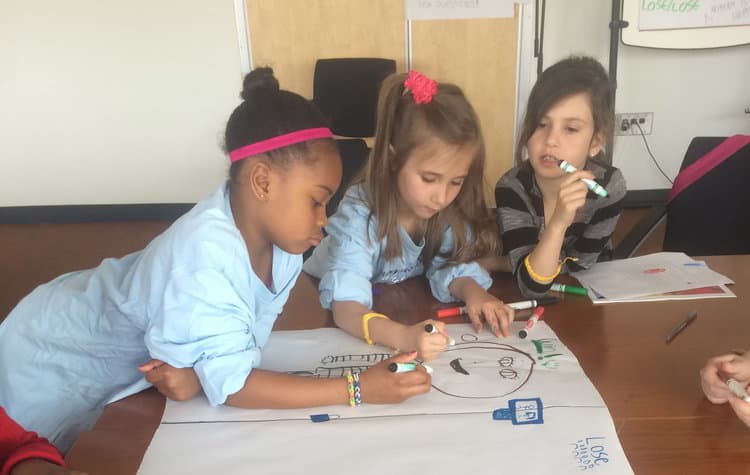
5 tips for helping girls overcome the confidence gap
Women are achieving great things in the professional world: American women earn more college and graduate degrees than men; numerous studies report that companies employing women in large numbers are more profitable than their competitors. But despite this success, a recent Atlantic article points out that men continue to earn more income and promotions, and blames it on a “confidence gap” with devastating consequences for women.
As described in The Atlantic article, the well-documented lack of confidence that women display compared to men in professional settings stems from factors ranging from upbringing to biology. So what’s the solution?
The article cites Carnegie Mellon University economics professor Linda Babcock, author of Women Don’t Ask, who found that men initiate salary discussions four times as often as women do.
Babcock founded Carnegie Mellon University-based nonprofit PROGRESS (Program for Research and Outreach on Gender Equity in Society) that attempts to close this gap by teaching women and girls negotiation skills. As the article points out, building confidence and negotiation skills in young girls makes a difference.
PROGRESS has created an online game, DVD, Girl Scouts patch and curriculum to teach girls how to negotiate, as well as workshops for girls and providers working with youth to foster confidence in girls.
PROGRESS Executive Director Ayana Ledford offers parents some suggestions to instill confidence in their children:
Start early. Continue heaping praise on girls for their achievements, whether for academics, sports, the arts or overcoming personal challenges. “Research shows some girls start losing their confidence as they enter adolescence,” says Ledford. “PROGRESS provides resources [like the online game Reign of Aquaria] to start working with girls as early as age 7 to help counteract some socialized behaviors that hinder them now and as they enter their adult lives.”
Interrupt hurtful messages. “I’ve noticed even my own son, who is only 3 years old, saying things like ‘that’s a girl’s job,’ or ‘that’s what girls do.’ As parents, we need to have conversations about why kids feel that way,” says Ledford. Parents of both boys and girls should reassert that girls can do the things boys can do and challenge stereotypes kids might be repeating. This also means speaking up when kids talk negatively about confident girls. If kids describe a female classmate as bossy, Ledford suggests asking what that term means to them. Don’t automatically assume a negative connotation — discuss the benefits of being outspoken. “We should praise girls who are confident in their abilities and encourage them to continue to vocalize what they need and want,” she says.
Play sports. Ledford cites research showing that early involvement in sports increases confidence in girls. Sports give them the opportunity to take risks and deal with loss and disappointment.
“I personally run a lot, so I love Girls on the Run, which helps girls get out and be active regardless of level or ability,” Ledford says.
If your kids aren’t into sports, Ledford encourages programs that provide opportunities for public speaking. Many adults have a fear of public speaking that could deter them from taking advantage of opportunities that benefit their professional lives. Starting at a young age can help girls become comfortable with this crucial skill. Ledford says, “Girls are not fragile and it is important to allow them to fail so they can discover how to independently bounce back.” Local organizations like Assemble and Gwen’s Girls offer girls opportunities to learn about technology and build STEAM skills.
Be a role model. “We talk about girls needing to build confidence– parents need to be a model of that self-confidence. If you are in a dual-headed household, think about whether you are equally contributing to duties at home,” Ledford says. “There are a number of women who’ve attended my training sessions who are tired, managing their career and their house. I always ask them, ‘How is your partner contributing?’ I want women to be comfortable asserting that need for balance with household and parenting tasks.”
Ledford warns that your behavior at home could encourage negative (and positive) expectations of what it means to be a woman or in a partnership.
Ledford also has some favorite questions parents can ask kids. These include: “What went well today?” “Where did something not go as well?” “How do you feel about it?” “How do you think the other person felt?” “Did you do something about it (why/why not)?” and “What can you do next time?”
“We want kids to embrace the challenges they may face by problem-solving and having the confidence to persevere,” she says, adding that those questions let kids reflect.
“Our belief in our ability to succeed makes us more likely to pursue things, so a lack of confidence affects girls in every aspect of life. We want all girls to have confidence in their ability to reach their goals. By teaching girls to negotiate, we are equipping them with a skill that gives them the confidence to face the myriad of challenges they may encounter throughout their adolescent lives.”